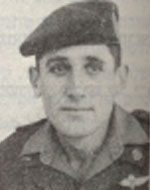Butnero, Shmuel
Shmuel, son of Lychee and Abraham, was born on September 1, 1948 in Hellen, Austria. He immigrated to Israel with his family that year. He graduated from elementary school in Ramle and Ramle-Lod High School and began studying at the physiotherapy school in Tzrifin. Shmuel was a diligent young man, a good student and an amateur athlete. He had a few hobbies: caring for animals and plants, and mainly interested in fish and had a sophisticated aquarium. His teacher at the high school testified that he was a “nanny” – participated in discussions and discussions with his friends about their future, and exhorted his friends to show responsibility for the state and its situation and to fully implement the obligations imposed on young people in Israel. Many wrote and spoke about the connection he felt toward the state, the people and the country. Shmuel enlisted in the IDF in the middle of August 1966. He completed a platoon training course, a platoon training course, a paratroopers course, and a course for infantry officers, serving in the engineering corps of the Paratroopers Brigade. After graduating from regular service, he married and worked as a computer operator for Israel Aircraft Industries, and he began to study a profession that was very interested in physiotherapy, Essential in the workplace His friends and schoolmates were impressed by his patience, his knowledge, and the fact that he was already treating the patients and patients in the hospital, and he was an exemplary family man dedicated to his wife and daughter. , Decorated and adorned him – and did everything energetically and industriously, amidst the workload of the day, the evening classes, including reading and self-work at night, and during the Yom Kippur War Shmuel was a commander of a paratroopers and infantry force that fought in the Golan Heights. With his soldiers he went through the course of the braking battles against the Syrians and the counterattack at the level. During the cleansing of the Syrian village of Khan-aranbeh, about half the men of his unit were killed. The unit suffered a severe decline in morale as a result of this disaster. At the time, Shmuel’s image was revealed as an officer, as a commander, a pain to his soldiers during a difficult crisis. With great effort and slow effort, he returned the morale to the injured unit and returned the unit to combat fitness. The unit was headed by the Syrian Hermon and part of the Syrian enclave. Shmuel commanded the Saragia post inside the Syrian enclave. The post under his command was exemplary and exemplary; Senior commanders visited Serjia and marveled at the manner in which the young commander conducted the outpost and how he led his men. Order and discipline were exemplary, food was plentiful even during the most difficult fighting hours, combat readiness was high. Shmuel was hit and killed by heavy shelling by the Syrians on his post on February 4, 1974. He was brought to eternal rest in the Lod cemetery. He left behind a wife and daughter. In a letter of condolence to the bereaved family, his commander wrote that Shmuel was a responsible officer, knowledgeable, knowledgeable and entrepreneurial, loved by all. In his memory and his image, he published a booklet entitled “Pathways in the Field” in memory of the fallen soldiers of the Engineering Corps in the Paratroopers Brigade.
